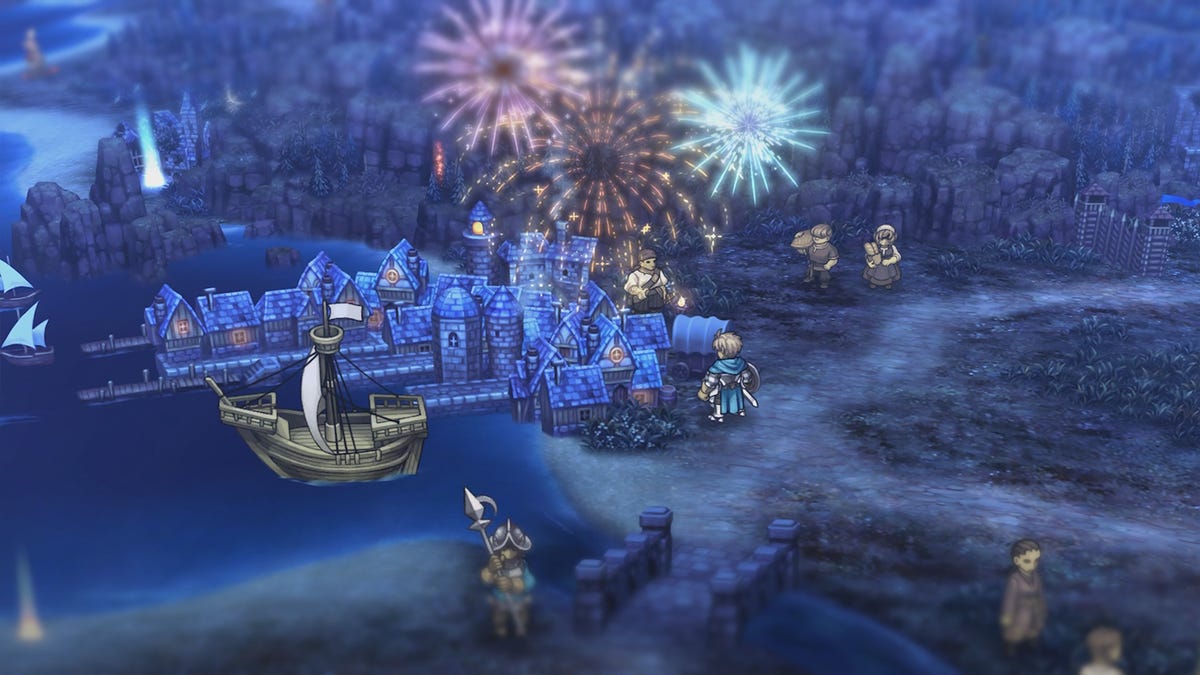Ahead of my hands-on preview with Unicorn Overlord, the new tactics RPG from developer Vanillaware and published by Atlus, I was told that nobody had beaten the demo yet. So I made it my mission to see if I could change that. Cut to two-and-a-half hours later, and I can see why people were having difficulty. I was in the midst of a massive battlefield, juggling multiple units of soldiers across a sprawling map and getting into fights with enemies twice my level. But after 45 minutes of strategizing (and the occasional save reload), I came out the victor.
The Best Resident Evil Goes VR And More New Releases | The Week In Games
Despite the game’s insistence that I was woefully underpowered for this conflict, all it took was some clever strategizing and careful combat to turn the tide in my favor. This was the moment Unicorn Overlord clicked. If anything is the mark of a great tactics game, it is the ability of the player to leverage strategy over raw power and win. My time with Unicorn Overlord’s opening hours left me eager to challenge even more powerful enemies when the game releases, just to see what I can get away with.
Unicorn Overlord is something of an inversion on Vanillaware’s previous title, 2020’s 13 Sentinels: Aegis Rim. Where 13 Sentinels put a heavy emphasis on story in the form of side-scrolling adventure segments interspersed with smaller real-time strategy combat encounters. Unicorn Overlord puts real-time strategy at the forefront, adding to and evolving in an exponential way upon its predecessor. We’ll get to the story later, but first let’s talk about gameplay. Because there is a lot to talk about, with the game’s systems becoming a melting pot of influences.
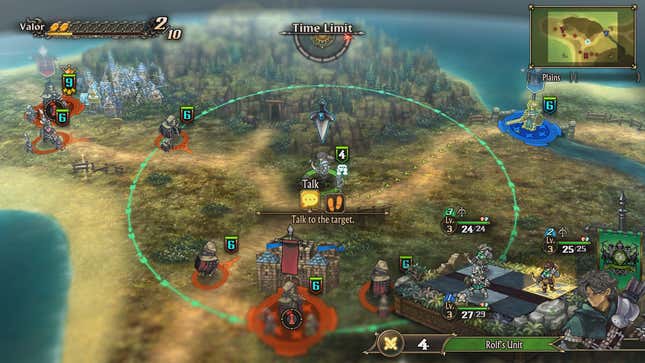
The art of war
After a handful of tutorials and some cutscenes that set up the stakes, Unicorn Overlord drops you on a world map full of towns, people, and enemies to encounter. You have an immediate goal but the overarching objective is to raise your renown across the many nations in hopes of gathering support for your cause. Towns littered around the map have suffered due to endless conflict, and they want your help. You accomplish this by completing special deliveries that rebuild the town and unlock new features as well as earn the support of the locals. Roaming the world inevitably leads to entering battles against enemy forces. These combat encounters play out on the world map and can be anything from short skirmishes to sprawling, time-consuming battles.
Players start from a command post and deploy units on the field and direct them towards objectives on the map in real time (though you do have the ability to pause, which I did often). Every battle has a win condition for the player and the enemy, oftentimes requiring you to beat whatever big boss is at the other end of the map. But there is much more going on then just watching your units fight it out as you progress forward.
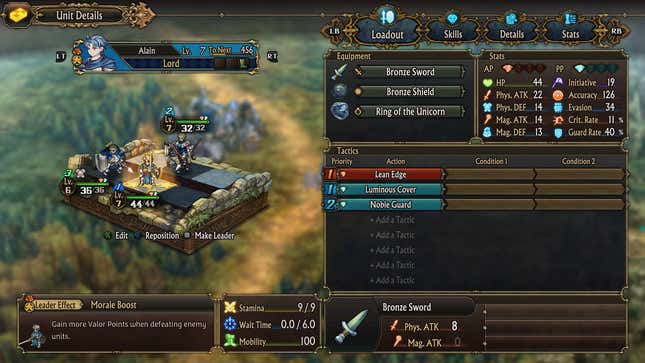
Every unit you have in Unicorn Overlord is made up of characters assigned positions on two-by-three grids, divided into a front and back row. When starting the game I only had access to two units, each with a limit of two characters that could be positioned on the grid. More units and more characters per unit can be unlocked with Honors, a currency gained through winning battles or helping towns. By the demo’s end I had four units, two with three characters and two with two characters.
Every character in Unicorn Overlord acts as a type of fighter with its own pros and cons. I relied heavily on Josef, a cavalry character with an advantage over characters using magic. Making Josef the leader of his unit also allowed him to move at a higher speed across the map, which was useful for flanking enemies or getting to key locations early in an encounter. But you can’t just rely on one overpowered unit. Every unit has stamina that, when depleted, leaves them open to attacks with no defense. The game also has shield users, magic users, characters with polearms. The list goes on and on.
Influences from Fire Emblem make themselves known when opposing units clash on the map, sending you to a separate screen that predicts the outcome of the clash and then allows you to watch it play out. This is also where the unit grid comes into play. Depending on how you organize your characters on the grid, clashes will play out differently. I quickly learned that putting all your characters in a single row was a big mistake when facing polearm users, as they could slash an entire row in one attack. Each character type offers some kind of advantage like this, such as shield users who can defend other characters, which becomes useful when trying to keep archers or magic users alive.
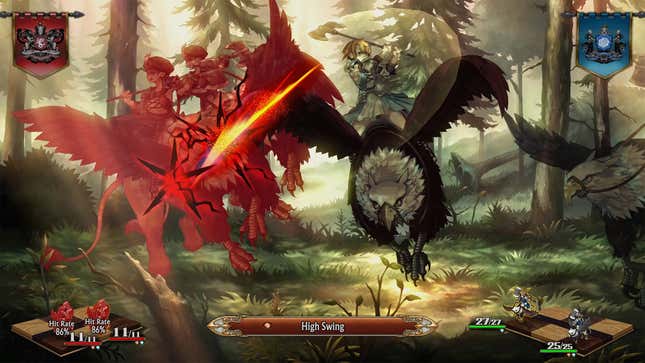
Planning is everything
The importance of character placement on the grid is just one of many ways Unicorn Overlord heavily emphasizes the need to think strategically about every decision, even the ones made before entering combat. Even in my short preview, I stopped before every encounter for minutes making sure I had optimized unit organization and equipment on every character.
This goes one step further with the Tactics system, which allows you to make simple rules for characters to follow in combat à la Final Fantasy XII’s gambits. Even as clashes occur without your direct input, I felt more invested in every time my characters duked it out against an enemy because I had been the one choosing their strategies. On the overworld during combat you can also activate special Valor Skills that characters have. My go to was to activate a skill that increased damage by 20%. These skills are activated with Valor Points, gained by winning clashes and capturing special points on the map. But Valor Points also are used to deploy more units, making them a valuable resource to manage as you can only ever have ten at any given time. With all that going on, the game quickly becomes a frantic battle that pulls your attention in every direction, requiring calm thinking and sound planning to succeed. Thankfully, you can save between clashes mid-battle. If that sounds like a lot, that’s because it is. But it is incredibly satisfying when put into action, like in my climatic battle that I took on underleveled but somehow came out the other side as victorious. It feels grand.
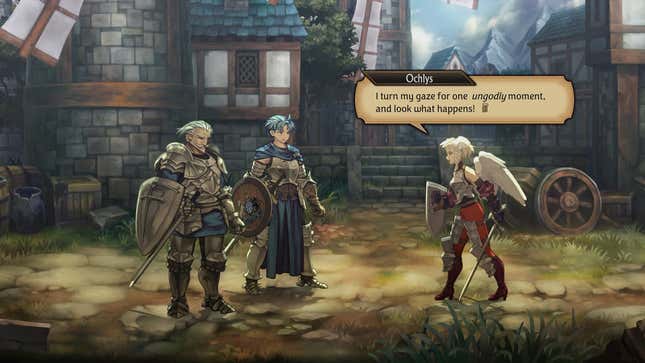
To have the best chance in combat, Unicorn Overlord encourages you to explore the world and collect more units. Like the Suikoden series, you will encounter characters asking you to complete a side quest in order to gain their trust and aid in battle. This is how I added both a flying unit (in the form of an angel) and magic user to my team. This is also where the story comes back into play. In brief, the player takes the role of Prince Alain, the rightful ruler of a kingdom now controlled by an evil general that betrayed the royal family and proceeded to take over every nation in the world of Fevrith. In order to take back his birthright, Alain must recruit companions to aid in his rebellion. That gives you the motivation to explore the world, rebuild towns, and meet special NPCs who will bolster your fighting capabilities. In the brief time I had with the game’s opening, it seems like Unicorn Overlord’s story is pretty boilerplate medieval fantasy fare. And while there are some interesting twists in the four hours I had with the game, I can’t talk about them in detail just yet. That said, I worry the game won’t match the narrative heights of 13 Sentinels. The most interesting storytelling elements lie in meeting new companions, who tie together interesting combat encounters to the game’s overarching story. You get to have a fun fight while seeing some flavor text about the world’s many peoples. It also helps that Vanillaware’s signature art style is on display in full force.
After four hours with Unicorn Overlord, I didn’t come away itching to learn more about Prince Alain and his noble quest. But I did come away eager to dive deeper into the intricately designed and interwoven combat systems at play that make every encounter feel exciting and dangerous. After some admirable but often repetitive strategy and tactics RPGs in recent years (mostly from Square Enix), Unicorn Overlord is shaping up to be a fresh entry into the genre with Vanillaware’s flair for style acting as the cherry on top.
Unicorn Overlord releases on March 8 for Nintendo Switch, PlayStation 4, PlayStation 5, and Xbox Series consoles.
.
